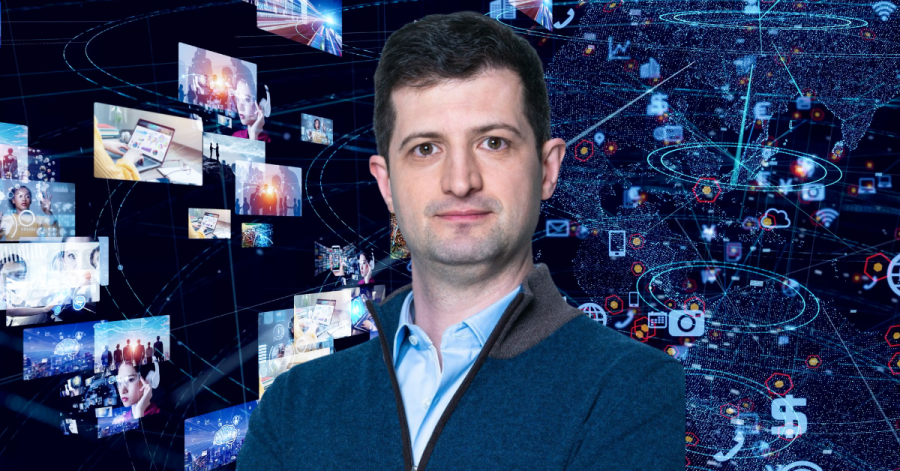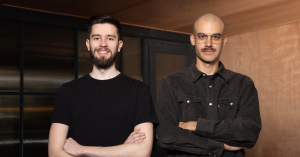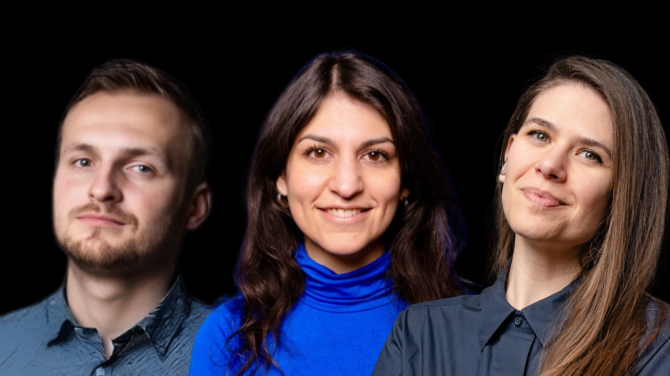Only have 1 minute? Here are 3 takeaways from the piece:
- WeTransfer has grown from a content-sharing service to a platform that supports the entire creative process.
- We chatted with Alexandar Vassilev, CEO of WeTransfer on the company’s evolution to a certified B Corporation.
- Vassilev recognizes the potential impact of AI on the digital creative space. He is leading WeTransfer in developing tools to help creatives navigate this evolving landscape, with a focus on enabling creators to stand out and monetize their work.
It’s 2009, and a small Dutch startup is about to revolutionize the way creatives share their work. Fast forward to today, and WeTransfer has become a global name, synonymous with easy content sharing and a suite of tools designed for the creative community.
At the heart of the most recent chapter of this transformational journey is their Bulgarian-born CEO Alexandar Vassilev.
The Recursive met with Vassilev at this year’s Webit Summer Edition where he took part in a fireside chat on the topic of “Empowering Creatives in the Digital Age: WeTransfer’s Vision for Sustainable Innovation and the Role of AI”. After his talk, he sat down with us and shared insights from his time at Google and YouTube to his current role at WeTransfer, offering his perspective on leadership, the evolution of the company to B-certified corporation, and the use of AI in the creative industry.
Vassilev’s journey in bringing products to market fast
Throughout his career, Vassilev’s thirst for international experiences and his fascination with technology led him from his native Bulgaria to the innovation powerhouses of Google and YouTube. Joining Google as an engineer and then product manager, he spent a decade contributing to the development of products across advertising, YouTube, and Google Search.
His time at Google, which included stints in New York, California, and Europe, gave him a global perspective on how to build products at scale and bring them to market fast. This experience was instrumental when he transitioned back to Europe to build a pan-European video streaming service called Joyn, a German joint venture that grew from a one-man operation to a 300-strong team in two and a half years.
When asked about the lessons he learned from these experiences, Vassilev says:
“It’s about relentless focus on solving the problem, understanding your user base, understanding who you serve, and surrounding yourself with incredible people. You should never be content with how good things are, and always think about ways of making them better”.
Transitioning to WeTransfer, he first joined as Chief Product and Technology Officer before eventually becoming the CEO. His prior experience in product roles allowed him to connect with the company’s DNA and its users. “Taking risks with your career and taking risks with the problems you’re solving eventually leads to things working out”, Vassilev says of his journey to the top of WeTransfer.
WeTransfer: The evolution of a company’s mission
In the early days of WeTransfer, the company was born out of a simple yet pressing challenge that was a daily reality for creatives. Picture this: a creative professional, their work complete and ready to be shared with the world, but faced with the daunting task of transferring large files to clients or their audience. The existing solutions were far from ideal – cumbersome FTP systems that were a nightmare to navigate for the uninitiated.
This was a frustration shared by WeTransfer’s founders, Bas Beerens and Nalden, who had to resort to downloading files onto USB sticks and hiring motorcycle couriers to deliver them. It was a time-consuming and inefficient process, a far cry from the seamless digital workflows we take for granted today.
In response to this challenge, WeTransfer transformed the arduous task of content sharing into a process as easy as a few clicks. But as the challenges facing creatives have evolved, so has WeTransfer’s mission.
Today, WeTransfer is more than just a file-sharing tool. It’s an integrated ecosystem for creatives, offering a suite of tools designed to facilitate seamless ideation, collaboration, and sharing of work. The platform also doubles up as a full-screen advertising billboard for brands looking for storytelling formats that engage audiences in an alternative way. Additionally, WeTransfer’s tool-set includes WePresent, an award-winning arts platform showcasing and commissioning work from creators worldwide.
The company’s core product, WeTransfer, includes features like improved content sharing from one to an audience of many, bespoke links and recent hero feature Portals and Reviews that helps creatives and teams to organize and simplify the client/collaborator feedback process.
As Vassilev puts it, “Our mission and our scope is increasing and our ability to influence different parts of the creative process positively is on the table in front of us”.
“We’re focusing on building capabilities across three key areas: content sharing, reviewing and collaboration and monetization. We’ve already made some exciting strides in the latter, exploring ways for creators to charge for their content. We’re committed to continuing to develop these pillars to help creators earn a living”, Vassilev continues.
WeTransfer, which became a certified B Corporation in 2020, has been profitable since 2013. It’s a privately held company, with the growth-stage tech fund Highland Europe as a major investor. As of 2021, the company had over 80 million active users per month and surpassed €100m in revenue.
The company has raised a total of €57M in funding over two rounds. The first round took place in 2015 with an investment of €22M from Highland Europe. The second round was in 2019, where the company raised €35M in an all-secondary round led by HPE Growth.
However, the company’s plans for an IPO were withdrawn in January 2022 due to volatile market conditions.
Building authenticity into the business model
Since its inception, WeTransfer has donated 30% of its revenue from displaying full-screen advertisements while transferring to raise awareness for artists and creative work. This commitment extends to partnerships with artists and organizations like Björk, FKA twigs, Marina Abramović, Riz Ahmed, the Nelson Mandela Foundation, the UN Development Program, and Seatrees, an ocean-focused platform for people and brands to take direct action on climate change. Most recently, it partnered with British producer duo Jungle to reimagine an album campaign through a series of content collaborations.
In the words of Vassilev, “We don’t stand between the creative and the audience, or the creative and their client, or the person and their receivers. And we as a platform really want to enable them, facilitate them, and not stand between the two parts”.
The company’s tools are designed to remove barriers and enable creatives to stand out, own their audience, and directly monetize and interact with that audience.
In 2022, WeTransfer’s dedication to the creative community was recognized when “The Long Goodbye”, a short film by Aneil Karia and Riz Ahmed commissioned by WePresent, won an Academy Award for Best Live Action Short Film.
WeTransfer: What does it take to become a certified B Corporation
As WeTransfer evolved and grew, so did its commitment to sustainable and responsible business practices. This commitment eventually led the company to achieve B Corporation certification in 2020, a designation that recognizes businesses that meet the highest standards of social and environmental performance, public transparency, and legal accountability.
But the journey to becoming a B Corporation was not a sudden pivot for WeTransfer. Rather, it was a natural progression. “Luckily, we have made some of these decisions about how to influence our own business with sustainability way before that. So for us, B Corp is just a testament that we are doing something well”, Vassilev says.
Navigating future trends
WeTransfer is not that different from any other company right now that has to navigate the powerful currents of artificial intelligence (AI). AI, with its potential to disrupt and democratize industries, is a double-edged sword. It can create turmoil in how businesses operate, but it can also break down barriers, simplifying the process behind creativity that includes creating, editing, and distributing content.
Vassilev acknowledges this duality, emphasizing the responsibility to ensure that creators can continue to make a living in a world transformed by AI. He envisions a future where AI leads to an explosion of content and a greater need for creatives to stand out for the right reasons and directly engage with their audience.
“Just as the internet did a decade ago – providing platforms like YouTube that allowed people from any location or social background to share their creativity with the world – I believe AI will continue to break down barriers. It will simplify the process of creating, distributing, and editing content, tasks that currently require a lot of time, skill, and expertise. AI will make these tasks more accessible for creatives everywhere”, says Vassilev.
WeTransfer is responding to these trends to help creatives better navigate this new landscape, and do so sustainably. “As a company, we’re developing tools and capabilities to facilitate this process. We’re doing it the ‘WeTransfer way’ – aiming to minimize barriers and friction for our users”, Vassilev concludes.








